The Woodcut Man
At the Louisiana Museum of Modern Art, Denmark
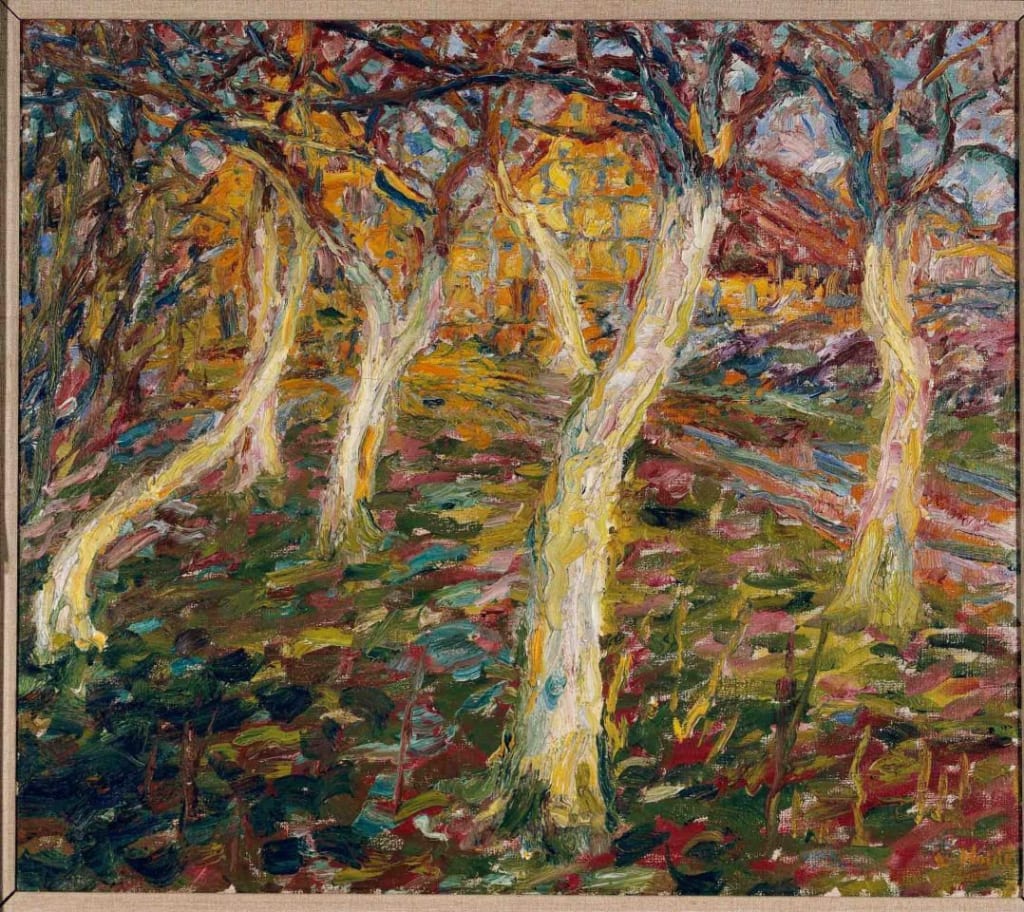
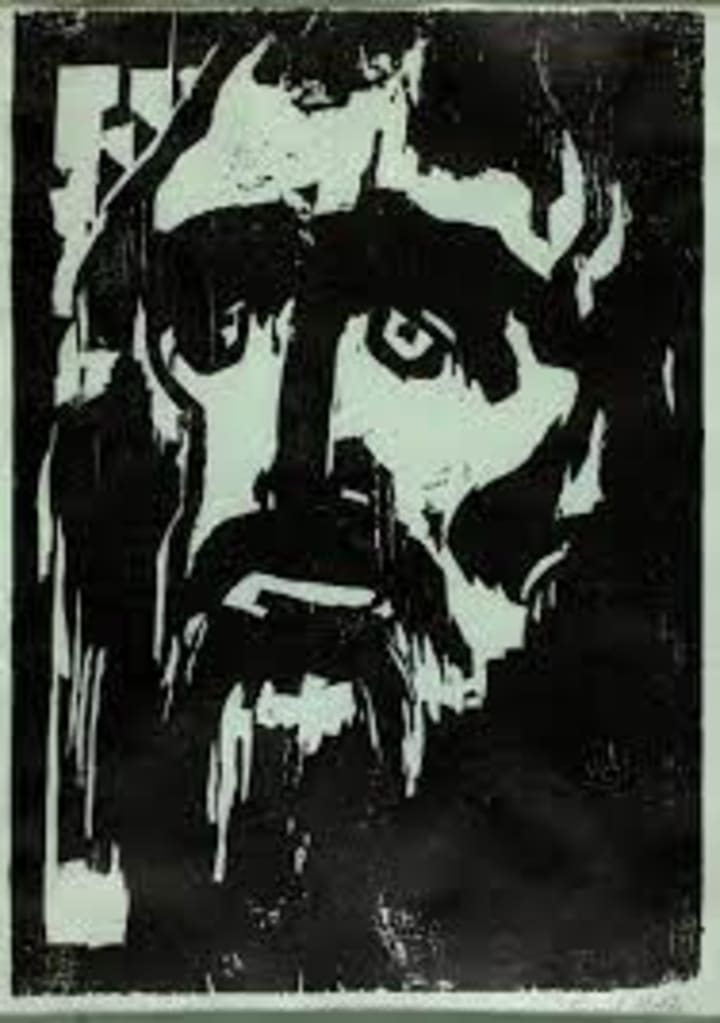
When Phaedra first saw the Woodcut Man, he was standing next to an orchard of pear trees, his stark black and white form contrasting with the soft, flowing colors of the trees and flowers surrounding them.
“What was the name of the stop again?” Vox said.
Phaedra lifted her face from the train window, leaving a light stain of fog from where her breath had hit the glass.
“Hoom-lay-beck,” she said.
Vox rubbed his eyes.
“Hoom. Lay. Beck.”
“You sound like a native,” she said.
“And how many stops is it?” he asked. She was already drowsy. Last night they had spent hours looking for the gothic clubs in the far corners of Copenhagen. The last half hour she had rested her face against the glass of the train window, drifting in and out of a light sleep while watching the Øresund appear and retreat along the Danish coastline.
“I think we have a few more to go. They’ll announce it on the intercom.”
Vox mumbled and typed something on his phone.
“You know we’re being charged international rates?” she said.
“I know that,” Vox said.
Beneath them, the vibration of the engines and the constant hammering of the wheels against the train tracks swirled like a restless tide within the interior space of their car. Among it, Phaedra heard a thin, breathy whisper intertwined with the background noise, mumbling in a single, fragile key. She craned her neck over the seat, scanning across the half-filled car among the blond heads and grey, northern daylight passing through the windows.
Across the aisle, two seats down, she saw the Woodcut Man between a middle-aged Danish woman and a watercolor orchard of colorful pear trees. Upon her first glance, the space where his eyes would be drifted out the window, his invisible pupils scanning the passing Danish countryside and the clouds and sunlight and hints of rain that seeped through the train windows. His form was sitting upright, but his color was dark like soot or burnt wood, stamped on the air as if scribbled by a toddler. Only a few key features were prominent, but the rest clearly defined by the negative space made to fill out his contours by the crude but efficient inky lines that defined him. Above the seat, a black wisp of a brow, underneath black wisps of hair. Upon the seat, black twirls hinted at a torso where jet black hands were folded. His would-be lips gaped and sometimes twisted in Woodcut labials, and Phaedra heard his voice across the sounds of the train engines and the whining of the wheels against the tracks, a crude, disharmonic whine, feedback blended with clumsy thunder. They found the wind passing through the pear trees and were carried away.
“So there’s this place called Christiania,” Vox said. “It’s this hippie commune outside of Copenhagen. We should check it out before we leave.”
“I heard that place got taken over by bikers and meth-heads” she said. If the Woodcut man saw her looking at him, he didn’t move to show it.
“Fuck if I know,” Vox said.
Above them, the train speakers squeaked to life.
Næste station, Humlebæk
"Does that mean 'next station?'" Vox said.
Phaedra watched the train slow as it approached their stop. Slowly, on flimsy, ashen bones, the Woodcut Man rose from his seat and followed them towards the exit.
By the time they had walked the half-mile to the museum the day had brightened somewhat. The thin stretch of sea was beginning to sparkle through the trees nearby. The Woodcut Man walked several paces behind them. Phaedra had noticed how the sunlight almost caught and unleashed lost colors in his greasy black frame. But he walked with his head down, eyeline straddling the ground, the static black fountain forming his back hunched and crooked to support the downward shift of his face and shoulders. Phaedra found herself slowing down, shifting back towards the Woodcut Man, listing to the caustic whine of his breathing and the deep, atonal rumblings from his empty chest.
”How much was admission again?” Vox asked.
”Oh god, I don’t know. I think it was like 100, 110 Kroner if you have a student ID.”
There was a short line at the museum entrance. The Woodcut Man fell into line behind them. She didn’t turn around to look, but she waited for any hint of his breath to fall across the skin of her upper back that was left naked in her tank top. She closed her eyes and felt something cool and foreign, sharp but undistinct from the late summer Scandinavian winds.
”Who’s Emil Nold?” Vox asked.
”I think it’s Nolde,” she said. ”That ’e’ at the end is called a schwa.”
”Cool,” he said. ”The sign says they have a special exhibit on him.”
”I guess he was an artist,” she said.
The sign bearing his name stared back in a fragile black portrait of a face, black lines twisting and merging so as to allow only a hint of what might have been human. To the left of the face was Nolde’s interpretation of a pear orchard in watercolor. To the right was a barn owl, cast in deep brown, yellows and dark green, its wings spread as it ascended from its branch into flight, its wide, deep eyes cast just past the viewer's gaze with an indecipherable expression, conjuring endless possibilities always just behind. Just out of view.
The two contrasted against each other in the low nordic daylight.
”He’s an expressionist, I think,” she said. ”Or at least he was. He’s probably dead now.”
”Don’t know what that means,” Vox said.
”Being dead?”
”Expressionist.”
Behind her, the Woodcut Man groaned in a disharmonic wail. Walking must hurt him, she thought. All of that weight balanced on his thin frame.
“Do you want to see the sculpture garden?” Vox asked.
Phaedra peered out the panel window towards the grassy clearing outside. The café was on the other side of the garden, garrisoned by the woods and the water on the other side.
“Where’s the Nolde exhibit?” she asked.
Vox flipped through the guidebook. “I think it’s out by the terrace? Next to the permanent exhibits.”
“Which are?”
Vox jutting a finger into the air. “…that way?”
In her peripheral vision, the black whirls of the Woodcut Man floated past them and went out onto the lawn, among the sculptures where tourists had already gathered in the pre-noon Scandinavian sun.
She found him again in the Nolde exhibit. She and Vox had tried the overpriced and oddly-textured Nordic acai drinks in the café before circling around to the temporary galleries. The Woodcut Man was hovering near a wall of watercolor paintings of flowers. At the angle where Phaedra was standing, his form was transposed against a primitivist rendering of the crucifixion. She noticed, in the hollow light of the building, how his face seemed to melt in synchronicity to the clownish guise of Christ hung behind him, rendered on a cross that propped his flowing sinews against the effects of gravity.
Can you even see him? she asked Vox in her dream. He had already carried her into a lone cone of light in an empty hall, and the two of them danced to music that seemed to come from the air itself.
“A question,” she asked him. His hand had wandered from hers as he admired Nolde’s watercolor period.
“Yes?”
“When we first met,” she asked. She hesitated. The Woodcut Man was, she thought, out of ear range. She didn’t know why this was important, only the vague sense that such a creature was, inevitably, a vehicle for filtering all the world’s pains and longing from the air and hiding them in the infinite, negative space between the black, ephemeral wisps of his body. She shot her eyes in his direction. He wasn’t looking at her, but he had no ears that she could see, so she couldn’t tell what he could hear and what he couldn’t.
“…it was night, wasn’t it?”
“Night?”
“When we first met?”
He blew a wad of air through pursed lips. “I know it was sophomore years, two years ago. October, wasn’t it? Near Halloween.”
“It was a Halloween party,” she said.
“Right,” he said. His eyes weren’t on her, but at some empty point in space that could have hidden so many things. Nearby, the Woodcut Man hadn’t moved. His face, suspended against gravity like the clown Christ next to him, tilted on an angle, like a dog against a rogue smell in the air. She gathered herself closer to Vox and brought her hands to his shoulders.
It was night, and the breeze blew something from the north, she thought. It was a blood moon...a full blood moon, and the October wind was chilly, though we were drunk and didn’t notice. We didn’t dance, but you let me lean on your shoulder as we left the party, and I wanted to ride the wind to wherever it was trying to take us, in a sea of young voices, beyond the farthest stars against the hills…
Later in the evening, about an hour shy of midnight, she lay beneath Vox in the slim bedding of their hotel room, listening to his breath swell over her face and neck, smelling his Euro-style deodorant and the marijuana that was still palpable on his breath. Afterwards, lying together, Phaedra couldn’t hear any thunder outside, but rather the bustle of late-night Copenhagen traffic and a hint of a faint northern breeze rattling against their window.
“You still set to graduate in May?” he asked.
“I assume,” she said.
“We could drive westward, across the country,” he said. “Like out to California. We could get a place somewhere in the Canyon, or out by the beach, write screenplays together.”
“Or run a mobile bookstore,” she said.
“What’s that?” he said. He was already getting drowsy, she sensed.
Within fifteen minutes he was asleep. She lay on the bed, her eyes open, long-ago adjusted to the darkness of the hotel room and the few lights that streamed in from the city on the other side of the curtain lowered against the window. Next to her, she heard the soft, rhythm, whirring of Vox's snores as he fell into a deep sleep to which she was irrelevant. His breath ascended and descended in a machine-like precision, radiating and contracting in whirrs and snorts. Along the ceiling vague colors danced between the darkness and the unformed spaces in her vision.
Vox's breath rose. A car passed outside, dragging the whining of its engine through the night.
Vox's breath descended. Suddenly, Phaedra was aware of something else, some other sound, slight but profoundly deep, a puddle revealing a secret, subterranean ocean.
Hoo. Hoo.
The noise, soft and primordial as an autumn wind, blew through the window and swirled in soft hands around the sound of Vox's snoring and Phaedra's own heartbeat.
Hoo.
A voice made from the elements themselves.
She got out of bed and opened the curtain over the window, revealing the Copenhagen nightscape outside. There, on the other side of the glass, was the watercolor barn owl. Despite the dark, its fragile colors seemed to gather all of the world's moon and starlight, and its wings, expanded beyond the edges of either side of the window, were spread to frame the bricks and artificial city lights in a cascade of watercolor motion. The owl looked at her.
No.
It looked passed her, at something profound and eternal that hovered just behind her, with an expression she couldn't decipher. She turned and saw only the door to her hotel room, the light from the hallway creeping in beckoning fingers through the crack under the door. When she turned back, the owl had already ascended into flight, leaving the watercolor outline of a pear tree painted in the canvas of the night outside her window.
She got dressed and wandered outside, past Tivoli onto Hans Christian Andersen Boulevard. She found an empty bench along Nyhavn. She sat down, watched along the water for the smaller boats to seep along the subtle current.
Hoo. Hoo.
She heard the barn owl before she saw it. Scanning her eyes, she eventually found its deep watercolor brown and yellow perched on a bench planted next to the canal, its wings still spread and its eyes still cast at something definite but invisible just beyond where her vision could reach.
On the bench itself sat the Woodcut Man. In the dark, the blends of his body faded into the surrounding night colors, but a nearby streetlight threw an angry, vibrating light and cast him in sharp contrast. The inky lines of his face melted towards the ground, seeping in unnatural angles across the empty spaces of his body She realized, looking at him, that the space undefined by the visible brushstrokes of his body was not, so much, the walkway and buildings that would be behind him, but instead a foreign, empty canvas, subtle, colorless dimensions curled up like waiting foxes in secret chasms that he carried with him. Both weightless and impossibly heavy. His body, twisted and bent, broken under the burden of carrying them.
She left the bench and walked over to him. Standing next to him at the bench, she heard something like his breathing, not a raspy inhalation like she had been expecting, but a constant, distorted hum, like a single wind looking for the sky but poured through rust and dead leaves. She reached out a hand to touch him—she never felt when her hand came in contact, but she saw the subtle realization slowly pulse across his woodcut face. But it was only a realization made far too long after the fact, the gradual accounting of the size of something too far lost to ever be recovered, the closest whole picture, already forgotten, made just before sleep, harkening unsettling but unremembered dreams, soon to be drowned in the tapping of raindrops against the window glass in the gray of early morning.
Phaedra ran her hands across the black painted lines of his body. Behind them, she felt the wind blowing off the watercolor pear trees flowing into the vortex of the city sky. Without thought, she gripped his blunt brush strokes, unraveled his threads, and let his burden fly loose, together with her, through the liquid branches of the pear trees, into the endless expansive sky, and the wind, and the impossible stars of the north.
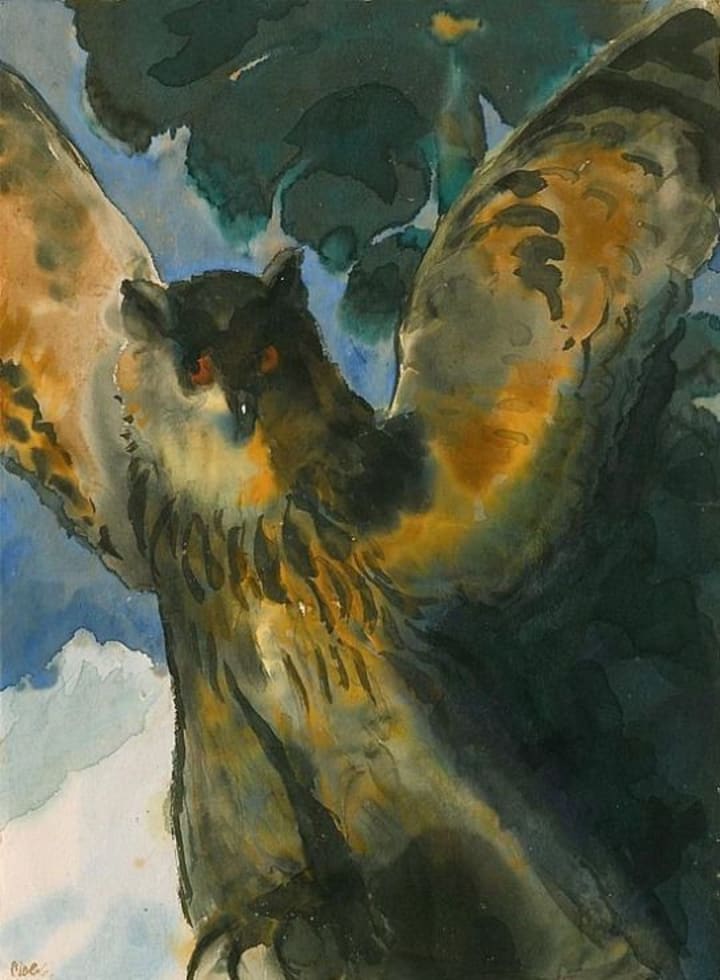
About the Creator
Enjoyed the story? Support the Creator.
Subscribe for free to receive all their stories in your feed. You could also pledge your support or give them a one-off tip, letting them know you appreciate their work.

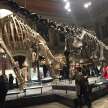



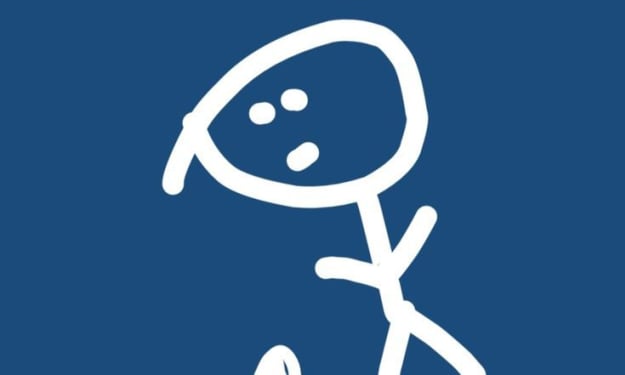

Comments
There are no comments for this story
Be the first to respond and start the conversation.